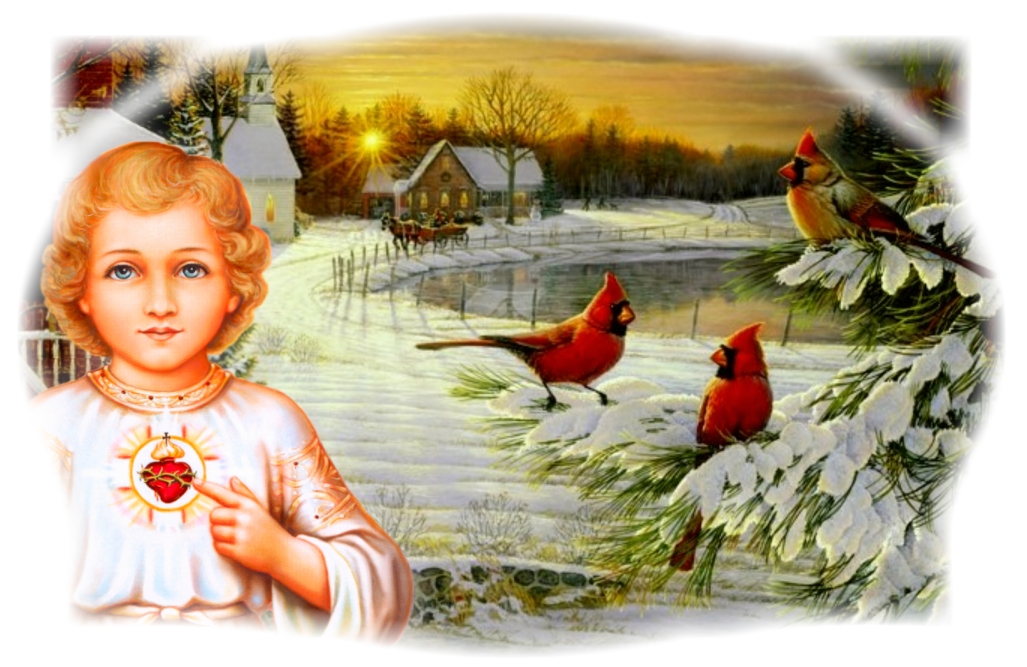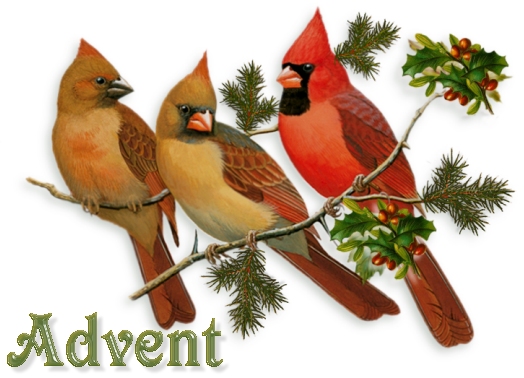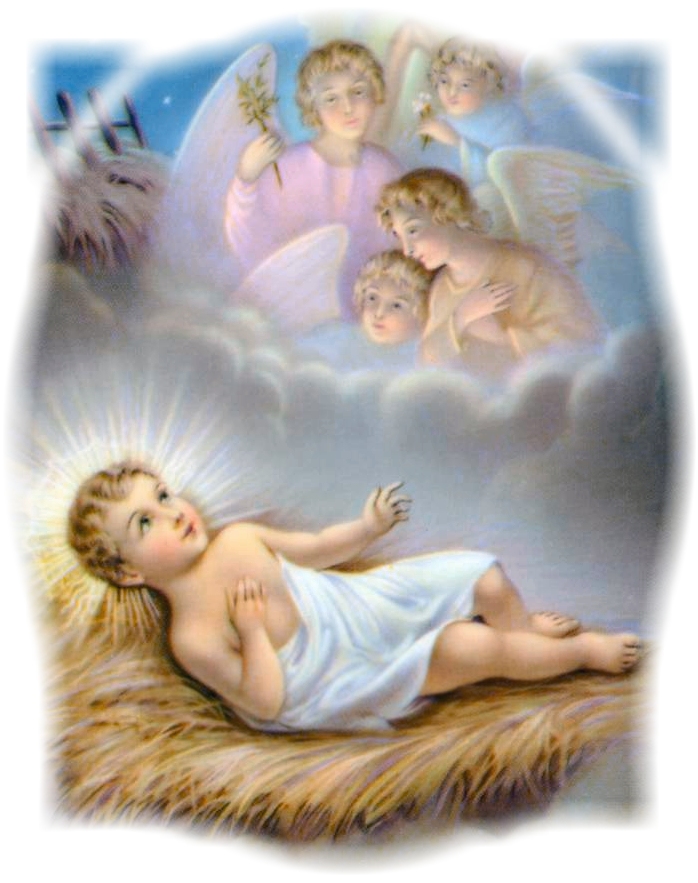  DISCOURSES FOR ADVENT Taken from THE INCARNATION, BIRTH AND INFANCY OF JESUS CHRIST by St. Alphonsus Liguori THE REDEMPTORIST FATHERS 1927 With Nihil Obstat and Imprimatur DISCOURSE I The Eternal Word Is Made Man Part 3 God came, then, to seek lost man; and that man might the more easily comprehend the love of this his God for him, and might surrender his love in return to One Who so deeply loved him, He willed, the first time of His appearance under a visible form, to show Himself as a tender infant, laid upon straw. "O blessed straw, fairer than roses or lilies," exclaims St. Peter Chrysologus "what favored land produced you? Oh, what an enviable lot is yours, to serve as a bed for the King OF Heaven! But, alas!" continues the Saint, "alas! yo are but cold for Jesus; for you know not how to warm Him in that damp cavern, where He is now shivering with cold; but you are fire and flames for us, since you supply us with a flame of love which rivers of water shall never quench."  It was not enough, says St. Augustine, for the Divine love to have made us to His Own image in creating the first man Adam; but He must also Himself be made to our image in redeeming us. Adam partook of the forbidden fruit, beguiled by the serpent, which suggested to Eve that if she ate of that fruit she should become like to God, acquiring the knowledge of good and evil; and therefore the Lord then said, Behold, Adam, is become one of us. [Gen. 3:22] God said this ironically, and to upbraid Adam for his rash presumption; but after the Incarnation of the Word we can truly say," Behold, God is become like one of us." "Look, then, O man," exclaims St. Augustine, "thy God is made thy brother;" thy God is made like thee, a son of Adam, as thou art: He has put on thy selfsame flesh, has made Himself passible, liable to suffer and to die as thou art. He could have assumed the nature of an Angel; but no, He would take on Himself thy very flesh, that thus He might give satisfaction to God with the very same flesh (though sinless), of Adam the sinner. And He even gloried in this, oftentimes styling Himself the Son of man; hence we have every right to call Him our brother. It was an immeasurably greater humiliation for God to become man than if all the princes of the earth, than if all the Angels and Saints of Heaven, with the Divine Mother herself, had been turned into a blade of grass, or into a handful of clay; yes, for grass, clay, princes, Angels, Saints, are all creatures; but between the creature and God there is an infinite difference. Ah, exclaims St. Bernard; the more a God has humbled Himself for us in becoming man, so much the more has He made His goodness known to us: "The smaller He has become by humility, the greater He has made Himself in bounty." But the love which Jesus Christ bears to us, cries out the Apostle, irresistibly urges and impels us to love Him: The charity of Christ presseth us. [2 Cor. 5:14] O God! did not faith assure us of it, who could ever, believe that a God, for love for such a worm as man is, should Himself become a worm like him? A devout author says, 'Suppose, by chance, that, passing on your way, you should have crushed to death a worm in your path; and then some one, observing your compassion for the poor reptile, should say to you, Well, now, if you would restore that dead worm to life, you must first yourself become a worm like it, and then must shed all your blood, and make a bath of it in which to wash the worm, and so it shall revive; what would you reply? Certainly you would say, And what matters it to me whether the worm be alive or dead, if I should have to purchase its life by my own death? And much more would you say so if it was not an inoffensive worm, but an ungrateful asp, which, in return for all your benefits, had made an attempt upon your life. But even should your love for that reptile reach so far as to induce you to suffer death in order to restore it to life, what would men say then? And what would not that serpent do for you, whose death had saved it, supposing it were capable of reason? But this much has Jesus Christ done for you, most vile worm; and you, with the blackest ingratitude, have tried oftentimes to take away His life; and your sins---would have done so, were Jesus liable to die any more. How much viler are you in the sight of God than is a worm in your own sight! What difference would it make to God had you remained dead and forever reprobate in your sins, as you well deserved? Nevertheless, this God had such a love for you that, to release you from eternal death, He first became a worm like you; and then, to save you, would lavish upon you His heart's blood, even to the last drop, and endure the death which you had justly deserved. Yes, all this is of faith: And the Word was made flesh. [John 1:14] He hath loved us, and washed us from our sins in His Own blood. [Apoc. 1:5] The Holy Church declares herself to be filled, with terror at the idea of the work of redemption: I considered Thy work, and was afraid. And this the prophet said of old: O Lord, I have heard Thy hearing, and was afraid ... Thou wentest forth for the salvation of Thy people; for salvation with Thy Christ. [Hab. 3:2, 13] Hence St. Thomas terms the mystery of the Incarnation the miracle of miracles; a miracle above all comprehension, in which God showed how powerful was His love towards men, which of God made Him Man, of Creator a creature. The Creator, says St. Peter Damian, springs from the creature, of Lord it made Him servant, of impassible subject to sufferings and to death: He hath showed might in His arm. [Luke 1:51] St. Peter of Alcantara, one day hearing the Gospel sung which is appointed for the third Mass on Christmas night---In the beginning was the Word---in reflecting on this mystery became so inflamed with Divine love that, in a state of ecstasy, he was borne a considerable space through the air to the foot of the Blessed Sacrament. And St. Augustine says that his soul could feast forever on the contemplation of the exalted goodness of God, manifested to us in the work of human redemption. For this reason it was that the Lord sent this Saint, on account of his fervent devotion to this mystery, to inscribe these words on the heart of St. Mary Magdalene of Pazzi: And the Word was made flesh. |

